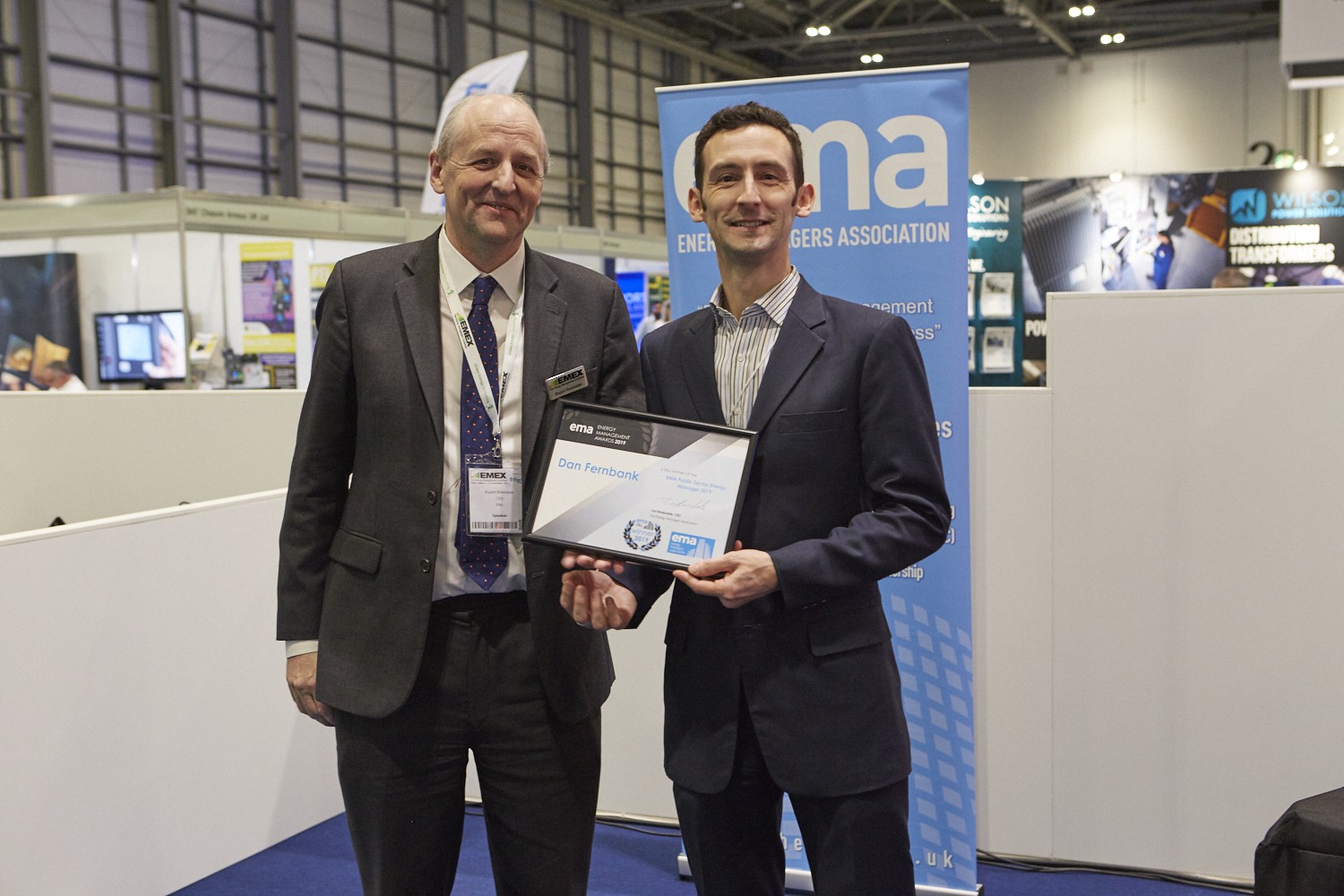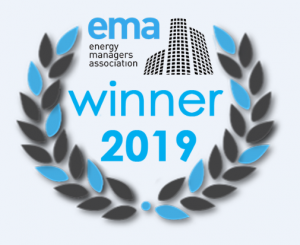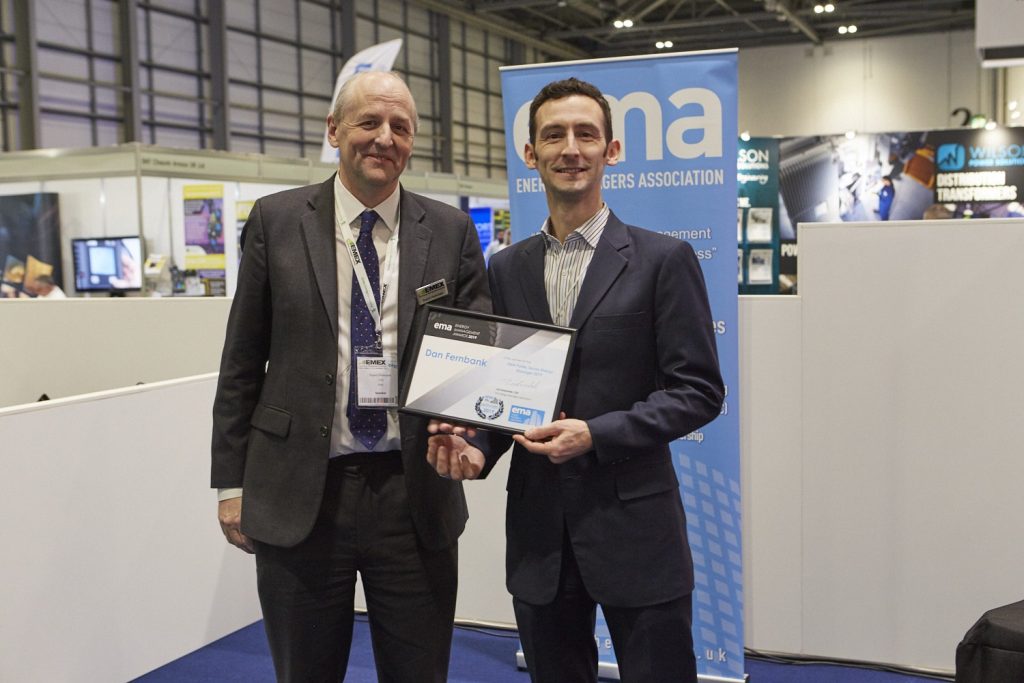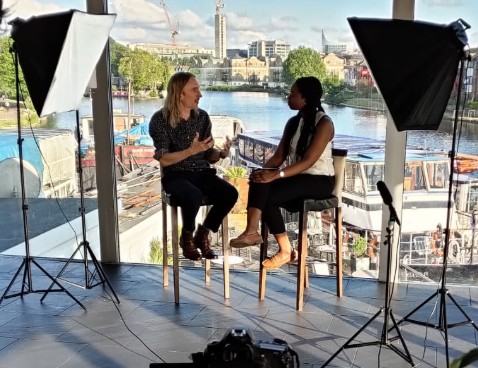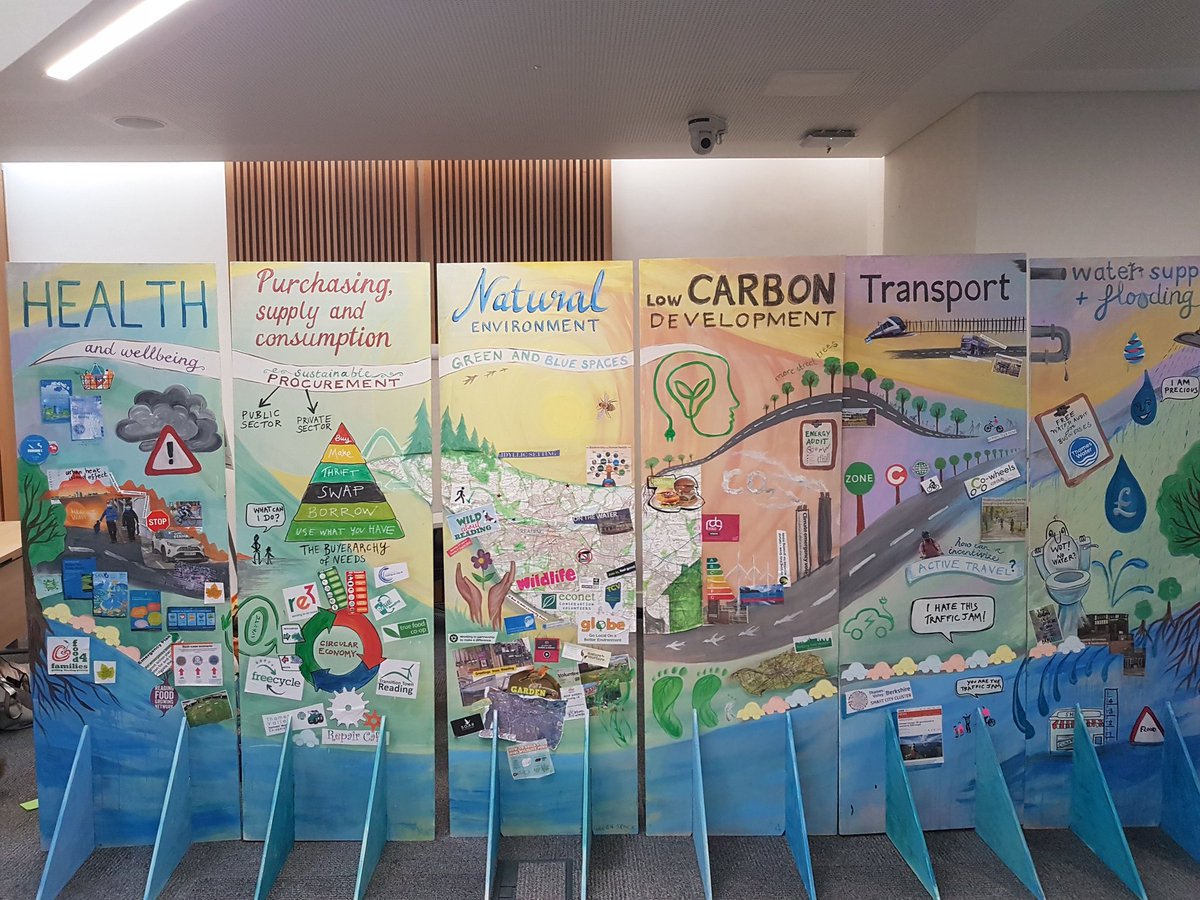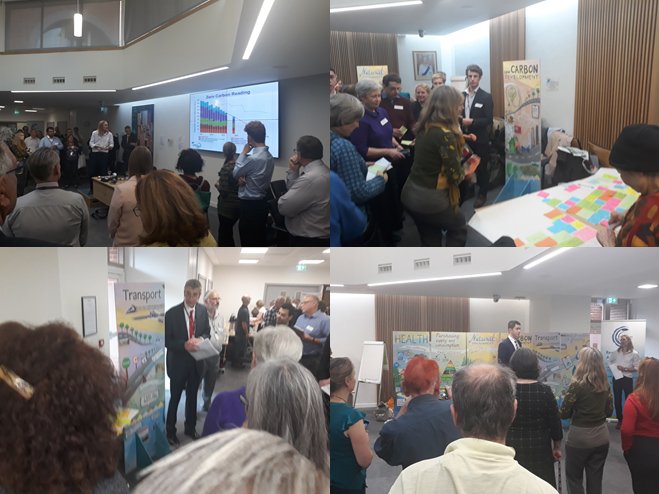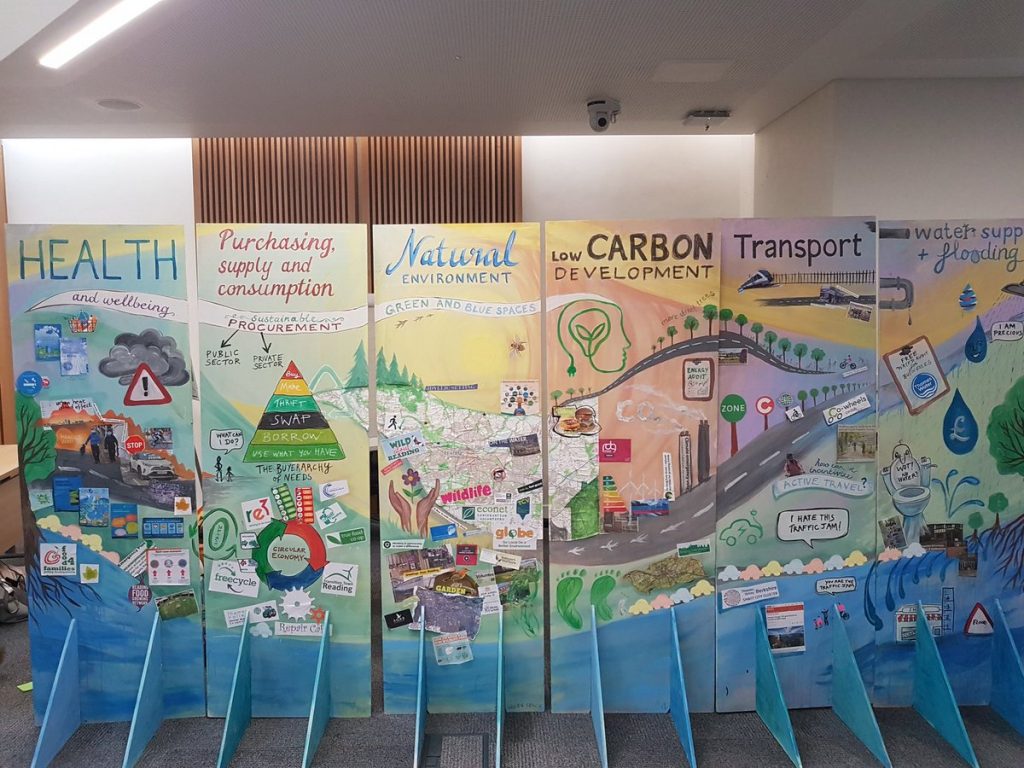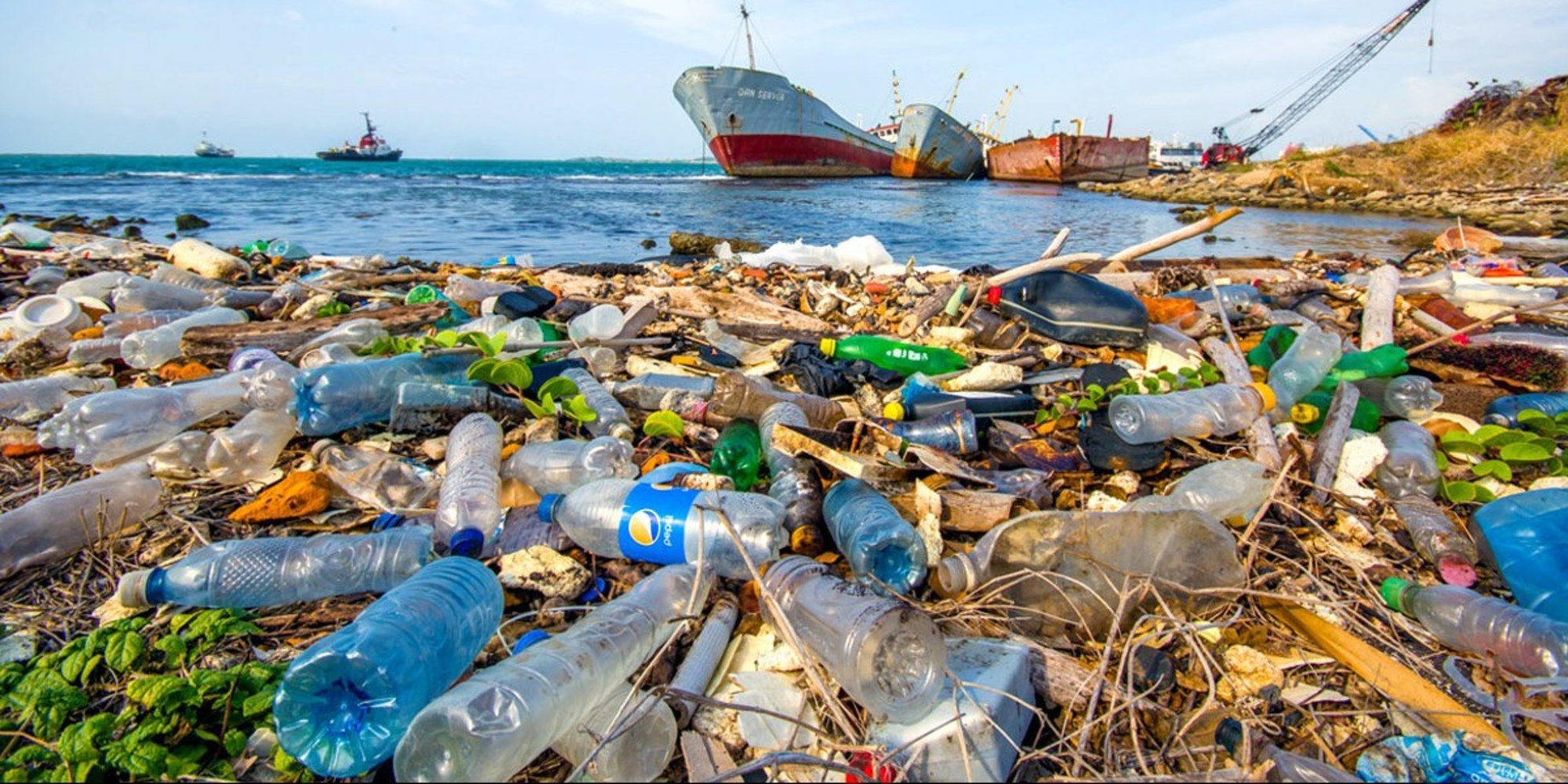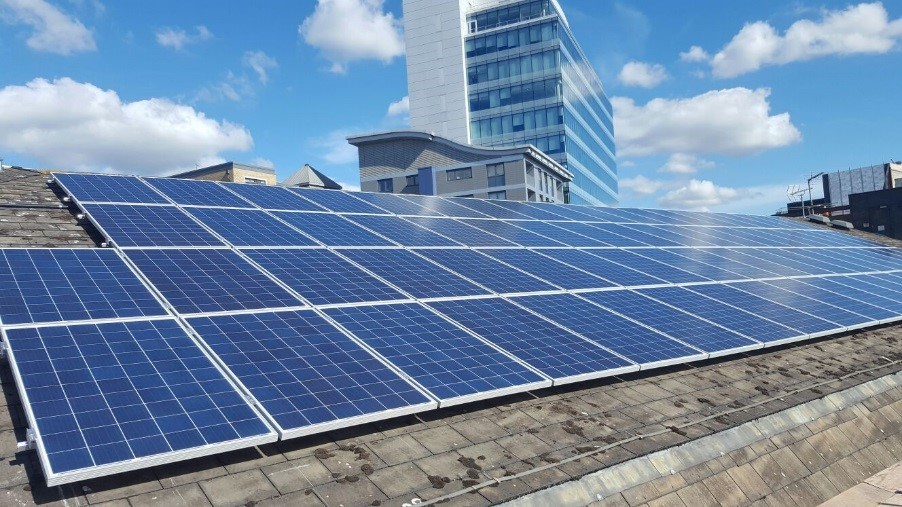Interested in installing air source heat pumps in domestic buildings? Then join this free zoom seminar from Bath and West Community Energy on 6th August at 7pm. For more information about the speakers and to register for this event go to https://www.eventbrite.co.uk/e/renewable-heat-and-heat-pumps-tickets-112789386090
Reading University Energy Manager top in public sector
The University’s Energy & Sustainability Manager, Dan Fernbank, has been awarded Public Sector Energy Manager of the Year at the 2019 Energy Management Awards.
Run by the Energy Managers Association (EMA), the awards recognise and celebrate outstanding work in the energy management and sustainability industry.
Dan has led the University of Reading’s Sustainability Services team since 2011. Some of the team’s main achievements during this time include:
- Ensuring the University met its 35% carbon reduction target in 2016 (compared to its baseline 2008/09 emissions)
- Achieving a 40% carbon reduction earlier this year – keeping the University on track to deliver on its current 45% reduction target by 2021
- Introducing a campus-wide refillable bottle scheme in partnership with Coca-Cola in 2017, helping to reduce the number of single-use plastic bottles on campus by more than 150,000
- Recycling more than 100,000 coffee cups since March 2018
- A major expansion of the University’s solar panel programme, with more than 1,000 individual panels now installed across campus
The EMA judges said: “The winning candidate has overseen an impressive reduction in the organisation’s carbon footprint which has put the organisation as a leader in their sector. The candidate has developed a number of tools which are used to monitor planned operational changes and identify the potential of energy and carbon savings in buildings. His drive is encouraging others to learn from the experiences and promoting the industry to future energy and sustainability professionals.”
Commenting on the award win, Dan said: “As a university with extensive expertise on climate change it is only natural that sustainability is at the heart of everything we do.
“Support and investment from the senior leadership of the University has enabled us to put many of these initiatives and practices into place, but it is participation of our staff and students that have helped us to achieve the fantastic results we have.
“It is very encouraging to receive this recognition from the Energy Managers Association. The University will continue in its efforts to make Reading a greener, more sustainable place to study.”
The award was presented at the EMA’s annual Energy Management Exhibition at Excel, London on 27 November.
Read more about sustainability at the University here – www.reading.ac.uk/sustainability
Grants of up to £5,000 now available to SMEs for energy efficiency projects
Low Carbon Workspaces is a grant scheme in Berkshire helping small and medium sized enterprises to make energy efficiency improvements or reduce their carbon emissions. Maximum grants of up to £5,000 are available to cover up to a third of the cost of energy efficiency projects.
The programme is operated by a specialist agency which will help appraise the project quoted cost and offer a green diagnostic to help identify other energy efficiency upgrades that could be made and how the scheme may be able to offer partial funding, subject to a successful application. Applications go to a Grant Panel who usually provide their decision within 3 or 4 days, although the operators stress that grants cannot be paid out retrospectively so it’s essential to follow the application process before undertaking any work or appointing suppliers.
You can find full details at: https://www.lowcarbonworkspaces.co.uk/
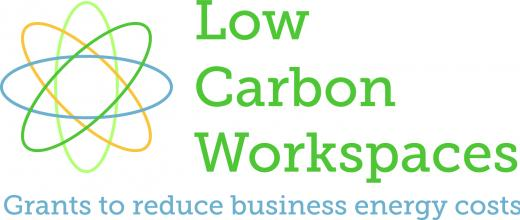
Reading Hydro Share Offer is now OPEN
Exciting News: the Reading Hydro scheme has all of its necessary permits and will be built and commissioned in 2020 at a cost of £700,000.
You can be a part of this by investing as little as £75
If you think you might like to invest in this renewable energy project for the town. then please go to the Reading hydro website and read ALL about it before making your decision: the plans, the risks, the potential investment return and the community benefits
For more information about the scheme and to access the share offer document go to https://hydro.readinguk.org
Things you can do about climate change – Interview with Chris Beales (RCCP Chair)
This is the third in the series of interviews with Ayo Sokale, in which Ayo asks me ‘…what things you can do about climate change’. I hope you find this useful.
- This ReadingCAN.org.uk website will be building up a lot of information over the coming years, which will help us all to become better informed.
- The other website mentioned, is the one I put together a few years ago. The Personal Action page is here: www.chrisbeales.net – personal action
Help us write the new Climate Strategy for Reading
We had a fantastic launch event on the 13th June. This opened the 6 month consultation on the 3rd Reading Climate Change Strategy.
Please do get involved: your ideas, energy and commitment are going to be really important to make a real success of this. You can take part in a number of different ways e.g. by attending meetings, commenting on proposals and encouraging others to also engage in shaping Reading’s future. To get in touch with the various themes, please find the contact details below:
- Water Supply and Flooding – water@readingcan.org.uk
- Transport and mobility – transport@readingcan.org.uk
- Health – health@readingcan.org.uk
- Natural environment and green spaces – nature@readingcan.org.uk
- Energy and Low Carbon Development – energy@readingcan.org.uk
- Purchasing, Supply and Consumption (Stuff) – resources@readingcan.org.uk
4 cross-cutting themes have also been identified:
- Education
- Adaptation (Resilience)
- Business
- Community
To get involved with these cross-cutting themes, or if you have any general questions or suggestions please contact info@readingcan.org.uk.
Each theme will have one of the action plans that are the backbone of the strategy. For more details about all of the themes, please scroll down.
Water Supply and Flooding:
The current strategic priorities are:
- to manage supply of and demand for water
- to provide guidance about safe reuse of water
- to reduce the expected impact of water shortages on consumers and on wildlife
- to reduce the risk of flooding, pollution, and potential damage to homes
- to develop an adaptation plan for Reading so we can plan for extreme events associated with the changing climate.
Key questions in meeting these aims are:
- What will prevent us from getting the water we need?
- How can we engage in practical water efficiency messages, calling people to help build a water efficient town, using and reusing water sustainably?
- How can we measure the real impacts of flooding, not only as events, but also the damaging effects to the local economy and the domestic, community, and business lives, and not to forget to the sustainability of the town?
We can then use this to draw together an outline plan for the Town of Reading.
To find out more and get involved email: water@readingcan.org.uk
Transport and mobility:
Transport has a key role to play in tackling climate change. Solutions to the transport and mobility question can also improving air quality and promoting health and wellbeing, whilst enabling economic growth and housing delivery. In addition to the Climate Change Strategy, the Council are in the process of updating the transport strategy for Reading, prioritising the provision of sustainable transport to encourage the use of public transport, walking and cycling as an attractive alternative to the private car.
Key questions in meeting these aims are:
- What is it about our way of life that encourages private vehicle ownership and non-low carbon transport infrastructure?
- What kind of alternatives can we imagine and how might we influence or bring about these changes?
- What technologies and solutions can help reduce the dependency on fossil fuel based transport systems whilst continuing to service our economy and communities?
To find out more and get involved email: transport@readingcan.org.uk
Health:
Climate change and associated air pollution is worsening physical and mental health and negatively affecting food production.
One of the key questions for this theme is:
- In what ways might emphasising climate change as a personal and public health issue in Reading encourage people to participate in steps to curb climate change?
To find out more and get involved email: health@readingcan.org.uk
Natural Environment and Green spaces:
The new local plan requires identification and enhancement of wildlife corridors through the town, connecting the existing green spaces and ensuring that new development contributes rather than detracts from these aims. Private gardens and business sites could be part of the solution. Green spaces need enhancement for nature conservation, management of water flows and droughts, assisting in reducing air pollution and urban heating and improving well-being.
One of the key questions for this theme is:
- What are the changes needed and how do we get the community to participate?
To find out more and get involved email: nature@readingcan.org.uk
Energy and Low Carbon Development:
Maybe one of the most challenging topics that is on the forefront of the Climate Change issue. We all need to find a way to reduce our energy consumption and use renewable energy for the energy we do use. This is closely linked to carbon emissions and solutions to both problems tend to go hand in hand.
Key questions in meeting these aims are:
- How can we bring about a reduction in energy demand?
- What renewable energy technologies will be best for Reading and how can these be encouraged and installed?
- How can buildings reduce energy consumption and are there alternative ways of heating and cooling buildings?
To find out more and get involved email: energy@readingcan.org.uk
Purchasing, Supply and Consumption:
In short: stuff. Every choice we make about what to buy and consume has consequences. Our society has come to rely on a make-use-dispose model of consumption that assumes resources are infinite – both the raw materials and the energy used to manufacture goods. We have come to expect to be able to buy out of season and non-indigenous foods regardless of the water, materials and energy used to grow, package and transport them. In a zero-carbon future, we will need better ways to harness and conserve resources to deliver the quality of life we desire without leaving an unwelcome legacy for future generations.
One of the key questions for this theme is:
- How are we able to consume less or in a much more considerate way?
To find out more and get involved email: resources@readingcan.org.uk
Cross-cutting themes:
The cross-cutting themes are common across the strategy. They do not have action plans themselves but they are useful lens to look across the 6 main themes. As we launch the strategy, we have identified 4 cross-cutting themes. This number could grow through time.
- Education – this theme covers the interaction with schools, colleges and other educational establishments, as well as a general sharing of our “learning about climate change” so we can all make better informed decisions.
- Adaptation (Resilience) – this theme captures the need to “Get Reading Ready” for the changes that we expect to happen with the changing climate. Weather patterns are already shifting, and the risks associated with extreme events are increasing. We must prepare for this, and our First Reading Adaptation Plan will help to guide our initial steps.
- Business – the business community has a very important role in helping us to deliver our strategy, as well as ensuring that each individual business is switched-on to the twin challenges of getting ready for climate change and cutting our carbon footprint to zero by 2030.
- Community – the community of Reading is diverse and complex, with varying levels of engagement and capacity when it comes to climate change. We need to grow the Reading Climate Action Network (ReadingCAN) to make sure we get through to everyone who lives, works and visits this town. We need to help people to make good choices and pick up an optimistic vision of the future for Reading.
To find out more and get involved email: info@readingcan.org.uk
About the new strategy consultation – Interview with Chris Beales (RCCP Chair)
It was my great pleasure to be interviewed by Ayo Sokale – one of Caversham’s new Councillors. This is the first in a series of five interviews. In this we talk about our plans for new Reading Climate Change Strategy.
We are writing the new strategy between now and Christmas. Please do get involved – you can find out more here:
PLEASE STOP Single-use Plastics
In 2010, eight million tons of plastic trash ended up in the ocean from coastal countries—far more than the total that has been measured floating on the surface in the ocean’s “garbage patches.”
That’s the bad news. The even worse news is that the tonnage is on target to increase tenfold in the next decade unless the world finds a way to improve how garbage is collected and managed.
There is absolutely no excuse for using single use plastics and we need to act now. Not only is this causing drastic climate change but is also killing the marine life and nature.
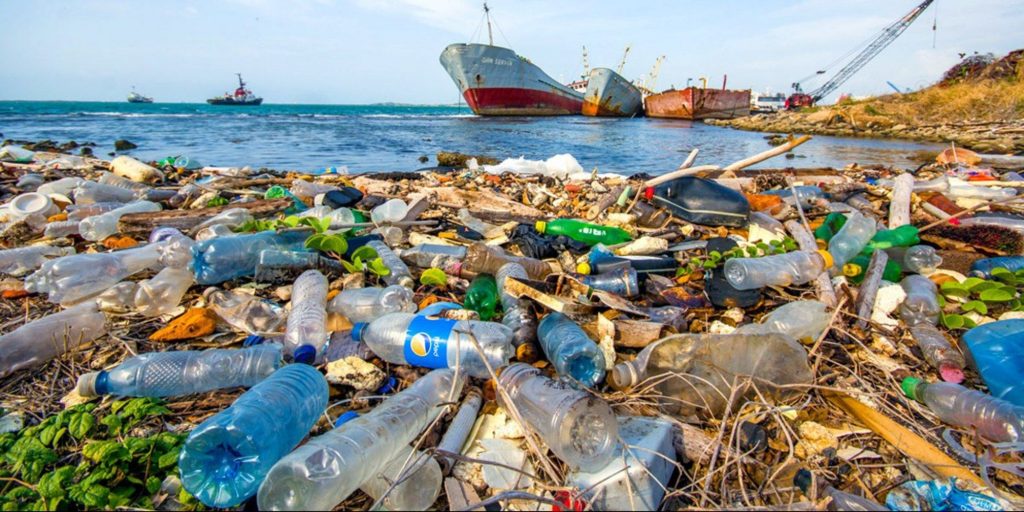
Maya Beach in Koh Phi, Phi Leh island in Thailand is now closed. After years of receiving 5000 visitors a day, pollution from litter, has destroyed around 80% of the coral around the bay.
- Seabirds and marine life are found with their stomachs full of plastic items
- Plastic are killing the coral reefs
- Plastics is found everywhere even the remotest parts of land and sea
Are We Also Eating Plastics?
This novel 3-D animation video from National Geographic dives into how our consumption of plastics has affected marine species deaths and increased human health risks, and it explores possible long-term solutions.
To read more and watch the video on how to keep plastics away from our oceans click here
The Guardian has provided results of a study that shows how bad the plastic footprint actually is. Please read the article here. Noting the huge carbon footprint associated with plastics…
“…This plastic binge threatens attempts to meet the Paris climate agreement. It means that by 2050 plastic will be responsible for up to 13% of the total “carbon budget” – equivalent to 615 coal-fired power plants – says the research published on Thursday….”
Will you switch off this Earth Hour?
Earth Hour is a global WWF (formerly known as World Wildlife Fund) climate change initiative which brings attention to the effects of climate change by asking people to switch of lights at homes and businesses for an hour at 8.30pm (20:30), local time, usually on the last Saturday of March. This Year it falls on 30th March.

From the Sydney Opera House and the Empire State Building to Buckingham Palace and Edinburgh Castle, communities like yours have switched off their lights in a symbolic show of support. Last year over 10 million people across the UK took part to send a clear message: We’re fighting for our world.
How Earth Hour helps?
Many of us feel powerless in the face of overwhelming threats to the planet. But when we all come together for Earth Hour, we create a strong voice that can change things for the better.
The power of our combined voices has already helped to:
- Influence climate policy in Russia, Argentina, Ecuador and Wales.
- Successfully push for planet-friendly laws, such as a ban on plastic in the Galapagos Islands.
- Inspire the world’s first Earth Hour protected forest in Uganda.
And 90% of people who take part in Earth Hour say it inspires them to do more to protect the planet
What you can do?
- It would be great if everyone can kindly turn off their lights, Computers and any electronic items they use on Saturday the 30th of March from 8:30 to 9:30 PM.
- WWF have partnered with Ariel to donate £1 for just pledging to make a change. So please go ahead and Make a Pledge for this amazing cause.
- Here are also some ideas from WWF about things you can do in the dark.
Invest in renewable energy with Reading Community Energy Society
Reading Community Energy Society (RCES) is launching a new community share offer this week, inviting local people and organisations to invest in renewable energy for the greater Reading area.
RCES is a community benefit society owned by its members and already runs 12 solar energy systems which have been generating clean, green energy for the past two years. In that time, their systems have saved 145 tonnes of CO2 emissions and they have awarded 3 community grants to support wider sustainability initiatives.
The Society are aiming to raise £363,000 so they can install new solar panels on ten buildings in the greater Reading area. The new solar panels will be installed on buildings including University facilities, 2 council buildings and a school. The project is off to a flying start having already installed panels on Woodford Park Leisure Centre in collaboration with Woodley Town Council and a recycling facility owned and operated by Select Environmental Services.
Tony Hoskins, Chair of RCES said:
“Encouraged by the success of our first group of solar projects, the Directors have worked extremely hard to bring together this new opportunity. As a community benefit society, we aim to build low carbon renewable energy generation to help tackle climate change, to raise funds for community projects and to give local people a chance to get involved and make a real contribution to work of the organisation.
By launching this second share offer and building more roof-top solar energy systems, we are opening the opportunity to even more people in an around Reading to get involved and join our existing membership. We hope local residents will take the time to visit our web-site, read the Share Offer document and consider joining us and investing in the new projects.”
Investments are invited from £200 – £20,000 and the Share Offer is expected to launch in the last week of February and will run until 29th March 2019.
More details on the scheme are available on the Society’s website – https://readingenergy.coop/share-offer-2019/ or Call 0845 373 3612
Or see the below attachment

